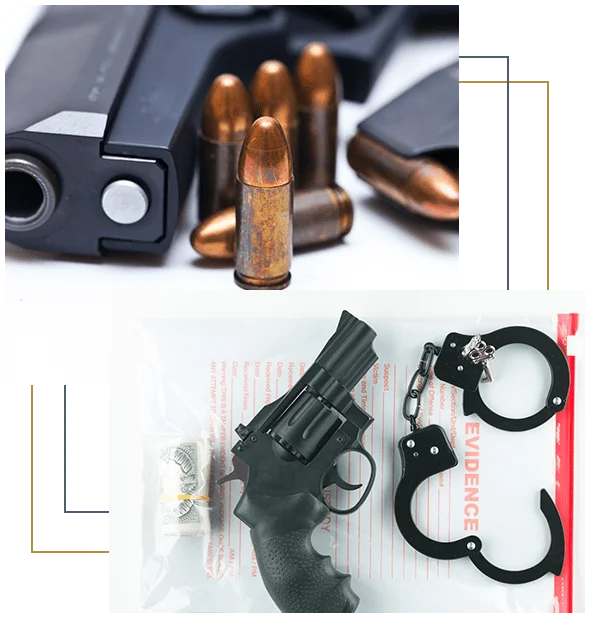Weapon Offenses

South Florida Weapon Offenses Attorney
23+ Years of Federal Trial Experience to Protect Your Gun Rights in Florida
Several criminal offenses could impact an individual’s right to firearms. If you have been charged with a weapons-related crime like theft of a weapon, using a gun during a drug trafficking offense, or possessing a firearm as a convicted felon, you could face serious legal repercussions. But you have rights—and we’re here to protect them!
At Frank Schwartz, P.A., we have defended clients against Federal charges for decades. We can take a detailed look at your case and fight for you like you’re a member of our family. You can expect to work directly with our South Florida weapon offenses attorney on your case, and we will use our former prosecution experience to your advantage.
Schedule a free consultation to discuss your Federal weapons defense options today with our South Florida weapon offenses lawyer.
Types of Weapon and Firearm Crimes in FL
Unlawful Possession of a Stolen Firearm
Federal law strictly punishes those who own or deal in stolen firearms.
More specifically, 18 U.S.C. § 922(i) and (j) establish that it is illegal for any person, licensed or unlicensed, to transport or possess a stolen gun or stolen ammunition if the person knows the gun is stolen. Violating this law could result in a fine and up to 10 years in jail.
Using a Weapon During a Drug Crime
Individuals who use guns in the commission of a drug offense are also harshly punished by Federal law. According to 18 U.S.C. § 924(c), the potential sentence depends on the type of firearm and how it was used during the crime:
- At least 5 years in jail for the possession of a gun during the offense;
- At least 7 years in jail for brandishing a gun during the crime;
- At least 10 years in jail if the gun is discharged during the crime;
- At least 10 years in jail if the gun is a short-barreled rifle or shotgun; and
- At least 30 years in jail if the gun is a machine gun or a destructive device.
If the defendant has multiple or prior convictions for using or carrying a gun during a violent or drug-related crime, the penalties could be more severe. A second conviction could involve a minimum sentence of 25 years or life in prison if the firearm is a machine gun or destructive device.
Note that a sentence convicted under 18 U.S.C. § 924(c) may not run “concurrently” with any other sentences; the defendant must serve the minimum sentence in addition to any other sentence they are already serving.
Possession of a Firearm by a Convicted Felon
Another important weapons-related offense is possession by a convicted felon (“felon in possession”). While every citizen has the right to bear arms under the Second Amendment, individuals who are considered to “pose a danger to society if carrying a weapon” may be stripped of this constitutional right.
Under Federal and state laws, the following individuals may not possess firearms:
- Convicted or indicted felons
- Fugitives from justice (anyone who has fled any state to avoid prosecution)
- Those convicted of a misdemeanor crime of domestic violence
- Those struggling with substance abuse
- Those with a serious mental illness or anyone committed to a mental institution
- Those dishonorably discharged from the Armed Forces
- Undocumented immigrants
Other Weapon Offenses We Defend Against
- Improper exhibition of a weapon: This is a first-degree misdemeanor charge that has to do with showing a weapon to another person in a “rude, careless, angry, or threatening manner.” The weapon in question could be anything from a knife to a sword, to a gun, or the like.
- Carrying a concealed firearm: Under § 790.01, it is a felony of the third degree to carry a gun out of the “ordinary sight of another person.” This means that it may be hidden in a person’s jacket or somewhere else on their person. Guns stowed away in purses are “about the person”; they qualify as concealed carry since they are readily accessible for that person’s use.
- Assault with a deadly weapon: According to § 784.021, assault with a deadly weapon is a type of aggravated assault charge, making it punishable as a felony of the third degree. The “deadly weapon” may range from a gun to a pipe bomb.
- Possession or discharge of a destructive device: It is a felony offense to possess, throw, project, place, or discharge a destructive device—or even attempt to do so.
Prosecutors use a drug scheduling scale provided by the Federal Drug Enforcement Administration to determine appropriate charges. Our South Florida drug crime lawyer will tirelessly work to reduce, dismiss, or even have your case completely dismissed.
Get Strong Defense for Firearm Charges
If you have been charged, our South Florida weapon offenses lawyer can handle your defense. We have taken more than 100 trials to both Federal and state courts. What’s more, we are known for getting charges reduced, dismissed, and dropped.
Put our over 20 years of experience to your advantage. We will work hard to strategize a powerful Federal weapons defense for you!
Let us protect your Second Amendment rights. Call (786) 648-7983 or contact our South Florida weapon offenses attorney online for a free consultation.
Penalties for Weapons and Firearms Charges
The penalties for weapon offenses will depend on the specific charge brought against you, as well as the specific facts of your case.
Some of the most common penalties include:
- Fines
- Jail or prison time
- Forfeiture of your guns or other weapons
- Restrictions on your Second Amendment rights, such as limiting your possession of firearms (and other weapons) for the future
Frank Schwartz
Attorney & Founder
Frank Schwartz is a South Florida attorney who concentrates his legal practice in the area of criminal defense. Mr. Schwartz is proud to have established a highly successful and effective criminal defense trial practice in South Florida.


